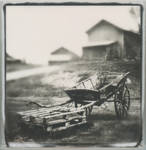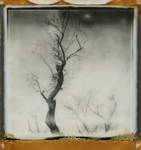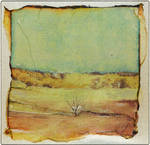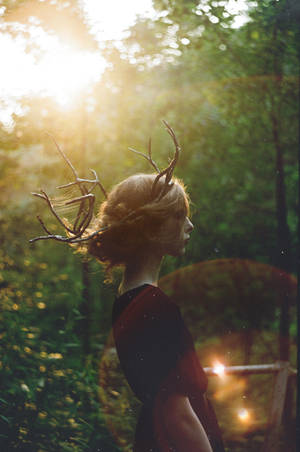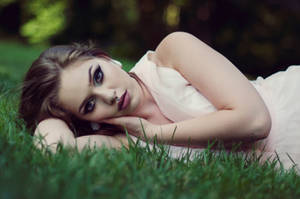Could you please introduce yourself to us? How long have you been a photographer? What led you to Darkroom photography?
TanjaMoss:
My name is Tanya Moss, I am 21 years old. I am the film photographer from Russia. I have been a photographer for 5 years. I was engaged in photography at the first year of training in art college. To darkroom photography I was led by accident: the film camera fell into hands and after the first film I understood that it would help display my inner world.
JillAuville:
I've always been into art, I started drawing at a young age, and I picked up my first camera at the age of 10 (I used to borrow my mom's point and shoot Agfa camera).
I dabbled with photography and traditional art off and on until my early 20's and then stopped , mostly because of frustration over my lack of talent.
I picked up my first digital camera many, many years later in 2004, and shortly after that I joined DA.
I fairly quick steered toward the darkroom category (first digital, a few years later traditional), mostly because it felt more artistically free & unrestrained to do so... but also, in all honesty, by calling something ''experimental'' (which the darkroom arts often are) you can actually get away with not knowing as much technically about the art form you're producing.
So if you're anything like me, slightly technically challenged (cameras have SO many knobs and buttons and settings), the darkroom is for you
How would you define Darkroom photography? More specifically, can you elaborate on the differences between Traditional and Digital processes? What are the advantages and disadvantages of each one?
JillAuville:
Traditional Darkroom = anything analog and film, and something that will cost you more money than the initial price of your base gear.
Digital Darkroom = digital photography that has been altered by adding layers, textures, filters etc = photoshopping! It is generally a one time cost, meaning you don't have to buy film and pay for developing; you buy your camera, lens, memory card and a software program, and you're good to go after that.
And on that note: the main disadvantage with traditional photography is, in my opinion, money. Everything will constantly cost you money, you always need film, and film is 90% of the time not cheap (think of film as a memory card you can only fit 25 images on and that you cannot erase anything off, so you have to buy a new one, over and over again). You may also have to add the cost of developing your film (either by having it sent out to a lab who does it for you, or by purchasing chemicals and doing it yourself).
The main disadvantage with digital darkroom for me is that it can feel static and unoriginal. We all have the same tools to work with, and it's easy to make something look advanced by way of editing in Photoshop... but generic Photoshop fixes can make stuff look like everything else. It's like slapping an Instagram filter over something: it's easy to do, but everyone does it, which means everything ends up looking the same.
TanjaMoss:
Film photography is something bigger, than the photo is simple. Film pictures possess a certain atmosphere, mystery and effect of "presence". It can't be achieve in digital photography, without having resorted to graphic editors.
What would you say is the most challenging aspect of Darkroom photography?
JillAuville:
The most challenging aspect of the darkroom is the traditional one: film is fickle. Old cameras are fickle. You can't view what you've shot until you've had it developed (and depending on whether you do it yourself or have films sent out it can take 1-14 days before you see the result of your shoot) (unless we're talking about instant photography of course, because instant is... instant).
When you can't view your image right away (like with digital images) you have to be either super talented and technical, or just plain ol' lucky.
When shooting film you HAVE to know what you're doing (which I almost never do), but here's a very rare example of mine where I DID know what I was doing:
I loaded expired 35mm film in a 127 film camera (quick tutorial on how to do so : www.youtube.com/watch?v=GqXCV0… ).
35mm film is not as wide as 127 film, so ALL of the 35mm film gets exposed when shooting, including the sprockets. This shot is double exposed (double exposure done by covering half of the lens in the first shot, not forwarding the film, flipping the camera upside down, and covering the other half of the lens when shooting shot no.2).
This shot is deliberate, and came out how I expected it.
The next one, not so much
This is from one of my first rolls shooting with my Holga. I had duct tape on the back piece of the camera to keep it in place, but it had fallen off in my bag and the film got exposed to light... and this ruined half the roll. This is the challenge of film. Something can so easily go wrong, and you need to redirect and/or rethink your original idea... embrace the mistake basically
What gear do you use? What would you recommend beginners in Darkroom photography purchase to develop their skills?
TanjaMoss:
For shooting I use the Minolta srt 200 camera and various self-made filters. I would recommend to beginners to listen to the heart upon purchase of the film camera. After all the film is able to feel and it needs to be chosen first of all as heart. Not to stop on reached, to be improved and not to be afraid of experiments.
JillAuville:
My digital gear: Canon EOS Rebel T5 (with lenses) and my phone, Samsung Galaxy Note 5 (and a Photoshop subscription).
My analog gear: I have over 150 analog camerasAround 40 of these are instant cameras (sadly, not all of them are in working order
).
I also have the Instant Lab from The Impossible Project, which kind of combines digital with analog, and it's probably my favorite one to use right now.
What are the benefits of Darkroom photography versus digital photography?
TanjaMoss:
I think that the opportunity not to process your photo is a benefit. The film perfectly renders color, lighting. Without use of a photoshop it is possible to reach magnificent results with digital. The main thing is to experiment!
Can you share with us one of your favorite darkroom photographs from your gallery, and tell us a little bit about the process through which you created it?
JillAuville:
I have a hard time picking out favorites from my galleries. It changes every day, most of the time I HATE everything I do and if I do like something it's usually something that no one else likes
Right this very minute I like this one from my digital gallery:
Shot with my previous dslr, the Canon EOS Rebel T3, and a Sigma aspherical ultra wide angle lens (converted to b/w and my own film texture layered over it). I have 2 Senegal parrots, the one pictured here is a little bit mean (and by little, I mean a lot). In this shot she was attacking me and the camera (the big chunky lens really, really bothered her and she wanted it dead).
... Anyhoo, my favorite analog image (right this minute anyway, probably because I'm a little homesick today and I miss Stockholm). This is a diptych on Impossible film using the Instant Lab camera:
TanjaMoss:
I have some favourite pictures. One of them "Eclipse". How I made this photo there are no secrets. I used the Zenit ET chamber and caught a sunset. That's all...
Please share any thoughts, advice or tips about Darkroom photography that you might have for our members; especially beginners who might not know anything about darkroom!
JillAuville:
Tip for darkroom beginners...as far as analog goes: do not be afraid to waste (film, time, money.... because you WILL be) and work with your failures instead of throwing them aside: if a developed image is deemed a failure, experiment with it instead of rejecting it. Set it on fire, bleach it, stain it with coffee, spill wine on it, freeze it...
No limits.
No rules.
TanjaMoss:
As I already said, you shouldn't be afraid of experiments.
Buy for a start the cheapest film camera, a film and start creating. Be not afraid to spoil your first film. With every following time your pictures will become better and better. It is important not to limit itself and to look for various ways of self-expression.

